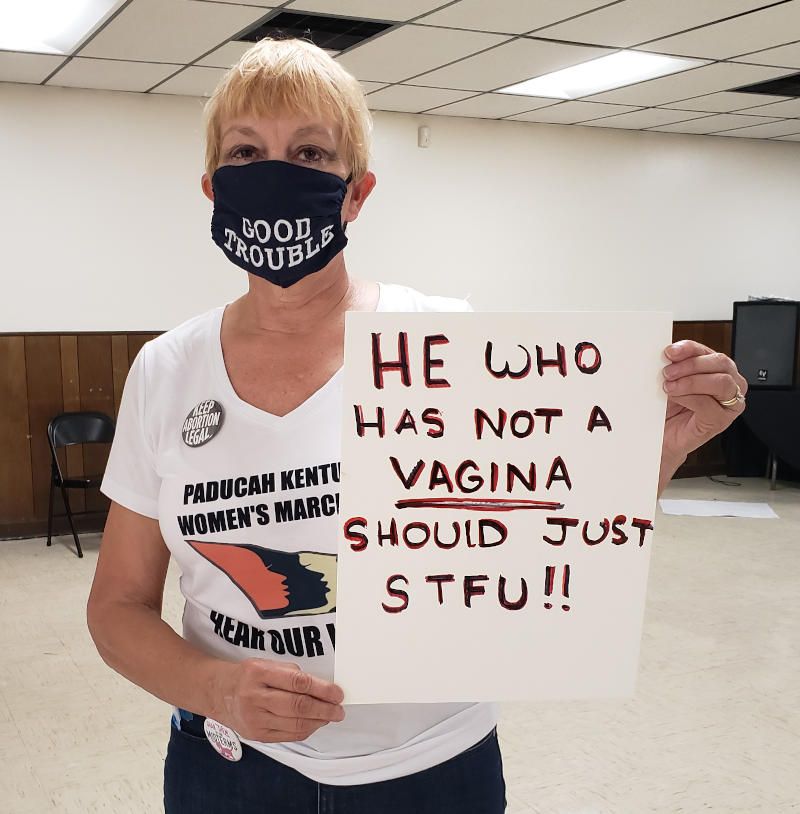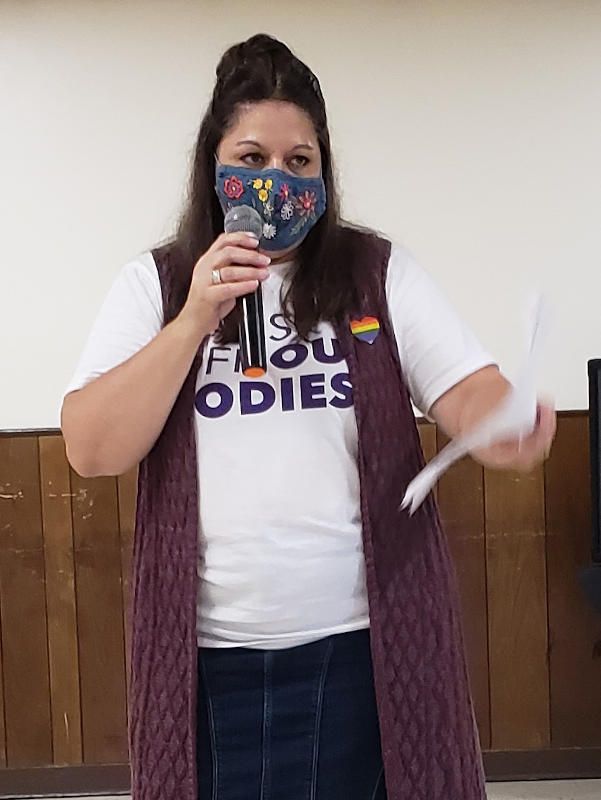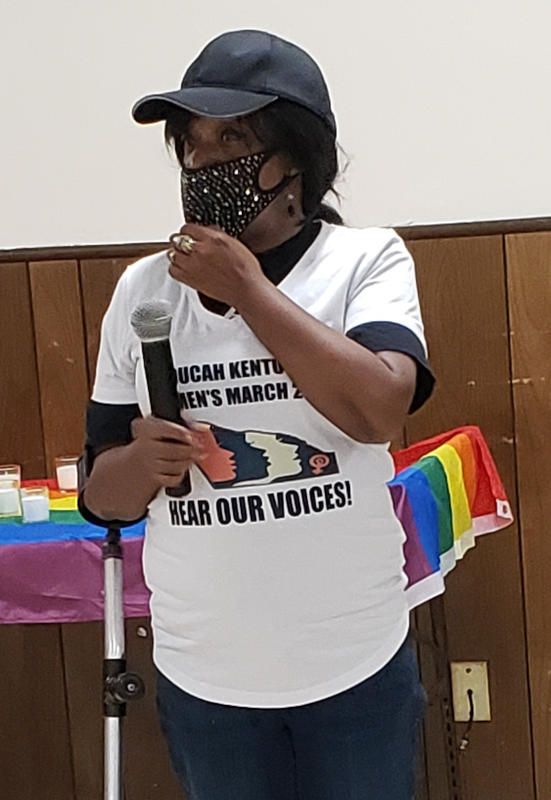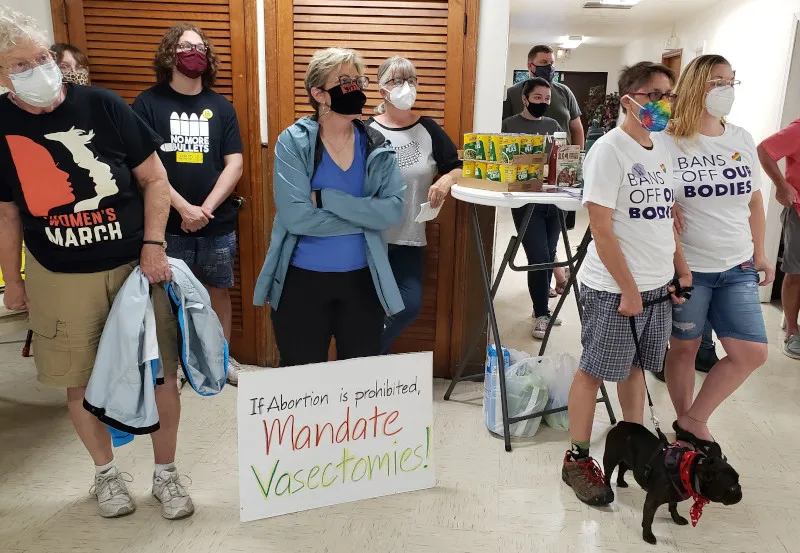Hard-right, anti-abortion Republicans rule the political roost in the Jackson Purchase, as far west as Kentucky goes.
But last Saturday, a group of about 40 women, plus around 10 men and boys, rallied in Paducah, the region’s main town, in support of Roe v. Wade and against state anti-abortion measures, including a proposed Kentucky constitutional amendment aimed at outlawing abortion in the Bluegrass State.
“They are forced-birth laws,” rally organizer Jennifer Smith said. “They have nothing to do with being pro-life.”

Heavy rain chased rally-goers indoors at the W.C. Young Community Center. But the downpour failed to dampen spirits, Smith added.
“There was a whole lot of enthusiasm and a whole lot of anger over what’s happening,” said Smith, who got organizing help from Betty Dobson, also of Paducah, and regional Planned Parenthood representative Charlotte Goddard of nearby Pottsville.

Smith, Goddard, Dobson, and others spoke to the crowd, which showed up from Paducah, Murray, and elsewhere in the Purchase.
Paducah was among scores of cities and towns nationwide — including Washington and New York — in which thousands of women and men marched and rallied for abortion rights. The Paducah event was also Zoomed because of the continuing COVID-19 pandemic. Everybody who came was masked, Smith said.
“We did a candle-lighting in memory and in honor of all those lost before and all those that we will lose if we continue on with these extreme [anti-abortion] laws,” Smith said.
The GOP-majority Texas legislature recently passed a law that effectively outlaws abortions in the Lone Star State. In December, the Supreme Court is scheduled to rule on a similar Republican-backed Mississippi law. Supporters of women's reproductive rights fear the high court, with its 6-3 conservative majority, will overturn Roe, which would lead to abortion bans in several Republican Red states, including Kentucky.

Smith pointed out that most supporters of anti-abortion laws also oppose government regulations to protect the public against COVID-19, the highly contagious airborne virus that has triggered the deadliest disease outbreak worldwide in a century.
“If they were pro-life, honestly, they’d get their vaccines, they’d mask up and be concerned that we have 700,000 people dead from COVID. It has nothing to do with ‘pro-life.’ They are just trying to control women.”
She added, “It doesn’t end with abortion. They’re targeting birth control, too.”
The Kentucky anti-abortion amendment will be on the ballot for the 2022 election. Given the state’s political, religious, and cultural conservatism, the measure seems likely to pass – with support from many women.
“I don’t get why so many women in Kentucky and in these Southern states are just okay with being 'less than' because that’s exactly what these laws tell us – women are not equal to men,” Smith said. “We are not allowed to make our own health care decisions. We are not allowed to have a private conversation with our doctor.”
She citied far-right-wing libertarian Kentucky Republican Sen. Rand Paul, who is anti-abortion. “For all his anti-government [views], he is fine with the government being up in a woman’s uterus.”
Smith said the GOP has “made it abundantly clear that they don’t care what their constituents think. They have politicized COVID. They — a bunch of white conservative men, primarily — don’t see anything wrong with forcing these horrific laws down a woman’s throat.”
Smith is not just for electing more Democrats who support women’s reproductive rights. “I’d like to see us do what women did in Iceland.”
She meant what went down in Icelandic history as “The Women’s Day Off.” Ninety percent of women went on strike, according to the BBC's Kirstie Brewer.
"What happened that day [Oct. 24, 1975] was the first step for women's emancipation in Iceland," said Vigdis Finnbogadottir, a divorced single mother who was elected president in 1980. "It completely paralysed the country and opened the eyes of many men."
Added Brewer: “Banks, factories, and some shops had to close, as did schools and nurseries – leaving many fathers with no choice but to take their children to work. There were reports of men arming themselves with sweets and colouring pencils to entertain the crowds of overexcited children in their workplaces. Sausages — easy to cook and popular with children — were in such demand the shops sold out.”
The strike lasted just one day but it led to an expansion of women’s rights and political power in Iceland. In 1976, parliament approved a law guaranteeing equal pay for men and women. Four years later, Vigdís [Icelanders go by their first name] was the first woman freely elected president in any country. And, abortions are legal in Iceland.








